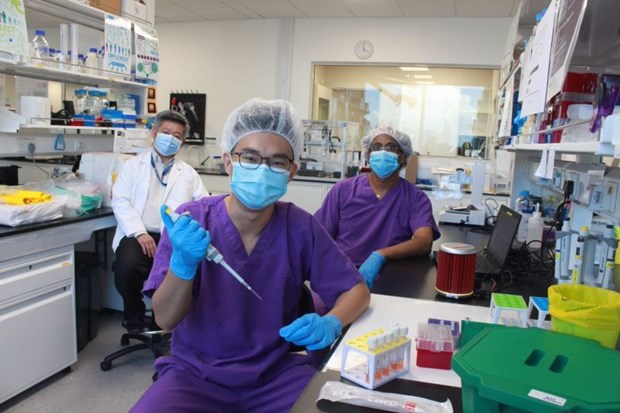Singapore scientists find out rapid COVID-19 test method
Scientists at the Nanyang Technological University (NTU) of Singapore on 27July discovered a way to deliver coronavirus testing results within 36 minutes, about a quarter of the time required by existing gold-standard tests.
 |
| Singapore scientists find out rapid COVID-19 test method (https://www.straitstimes.com/) |
Currently, the most sensitive method of testing for the coronavirus is through a laboratory technique called polymerase chain reaction (PCR), where a machine amplifies genetic material by copying it over and over again so any trace of the coronavirus can be detected.
A big problem is purifying the ribonucleic acid (RNA) from other components in the patient sample – a process that requires chemicals that are now "in short supply worldwide”, NTU said.
“The method developed by NTU LKCMedicine combines many of these steps and allows direct testing on the crude patient sample, cutting down the turnaround time from sample-to-result, and removing the need for RNA purification chemicals,” the university added.
In PCR tests, the genetic material on the swab sample has to be extracted to remove substances in the sample that prevent the test from working. One example of an inhibitor is mucin, a main component of mucus.
The test designed by the NTU team uses the “direct PCR method”, but removes the need for RNA purification – a time-consuming and costly step.
“Instead, they added inhibitor-resistant enzymes and reagents targeting compounds that obstruct RNA amplification, such as mucin … these enzymes and reagents, which are commercially available, have high resistance to such compounds that otherwise inhibit PCR, rendering the test inaccurate," said NTU.
The biochemical mix of crude sample and inhibitor-resistant enzymes and reagents is placed into a single tube, which is inserted into a laboratory thermocycler, a machine used to amplify genetic material in PCR. After 36 minutes, results reveal whether there is any trace of COVID-19 “with confidence”.
The team also tested this method on a portable thermocycler, which can be deployed in low-resource settings and endemic areas, pointing to the possibility of having this test done in community healthcare settings by frontline healthcare workers.
Senior research fellow Dr Sivalingam Paramalingam Suppiah said: “By skipping the RNA extraction step with our direct-PCR method, we see cost savings on nucleic acid extraction kits, and avoid the problem of reagents in short supply when lab testing is ramped up and the demand increases globally.”
Source: VNA